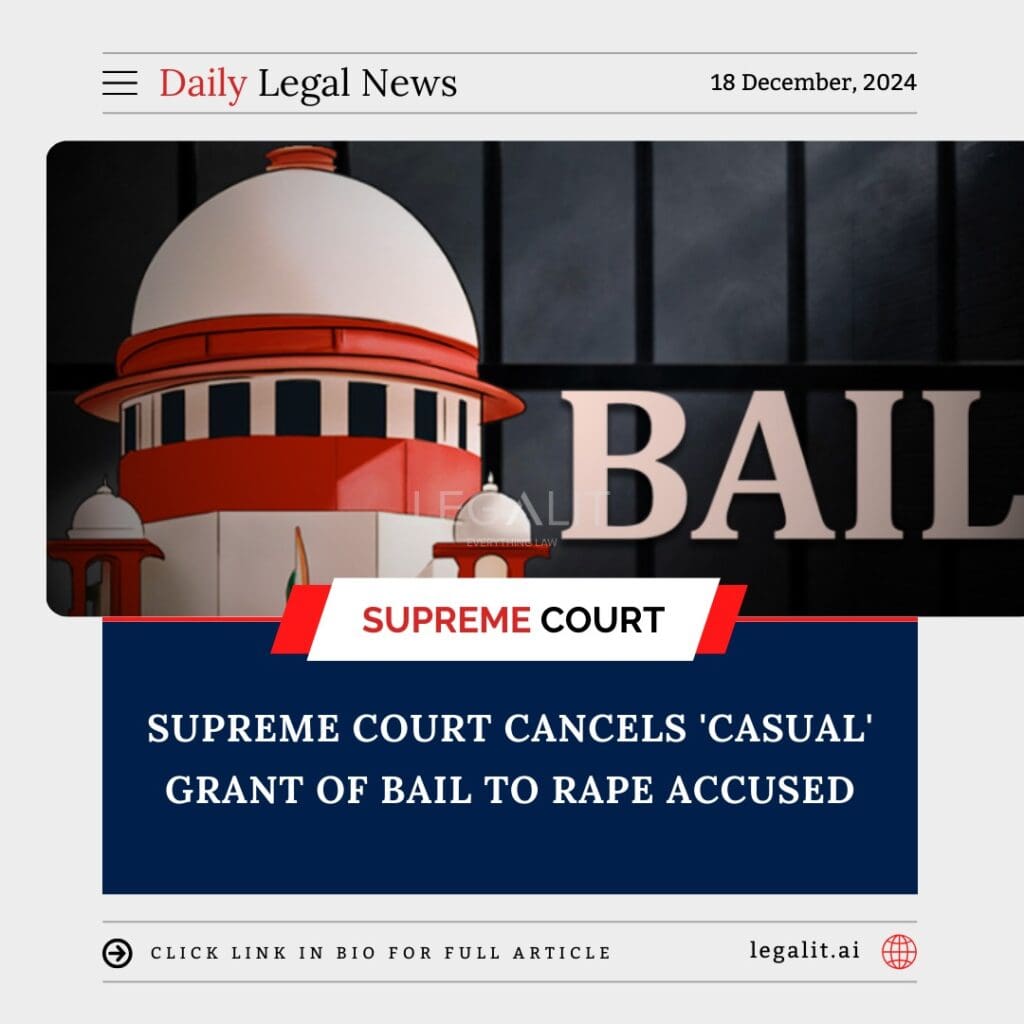
The Supreme Court of India has canceled the grant of bail to a rape accused, calling the decision “casual” and highlighting the need for more rigorous scrutiny in such cases. The court’s intervention emphasizes the gravity of sexual offenses and the necessity of ensuring that bail decisions are made with the utmost care, particularly in cases involving serious charges like rape.
Background:
The case originated from a decision by a lower court that had granted bail to an individual accused of raping a woman. The decision was challenged by the victim, who argued that the accused posed a threat to her safety and should not be granted bail due to the severity of the crime. The matter was then taken to the Supreme Court, which examined the bail grant and found it lacking in the thorough examination required for such serious charges.
The Supreme Court, in its judgment, observed that the lower court had not sufficiently considered the implications of granting bail to an individual accused of such a serious offense. The court expressed concern over the potential impact on the victim and society, stressing that bail decisions in rape cases should be made with heightened caution.
Key Arguments:
- Victim’s Stand:
- The victim argued that granting bail to the accused would put her at risk and compromise her safety.
- She contended that the accused, if released, could potentially intimidate her or interfere with the ongoing investigation.
- The victim emphasized the need for stringent judicial scrutiny before granting bail in cases involving sexual assault.
- Respondent’s Stand:
- The defense team argued that the accused was entitled to bail as per the established legal principles, including the presumption of innocence until proven guilty.
- They contended that the accused had no criminal history and was not a flight risk, thus making him eligible for bail under the law.
- The defense also argued that the evidence in the case was not strong enough to justify holding the accused in custody during the trial.
Supreme Court’s Observations:
The Supreme Court bench, led by Chief Justice DY Chandrachud, stated that bail in cases involving serious offenses like rape requires a much more detailed and cautious evaluation. It emphasized:
- The need for a balanced approach when granting bail in cases that involve the safety and dignity of the victim.
- Courts should carefully weigh the nature of the offense and the potential risks posed by releasing the accused.
- A ‘casual’ approach in such cases undermines the seriousness of the offense and could harm the public perception of the justice system.
Legal and Policy Implications:
This ruling sends a clear message to lower courts regarding the importance of a comprehensive evaluation in sexual offense cases. It also reiterates the need for the judiciary to prioritize the safety and well-being of victims when deciding on bail applications in sensitive cases like rape.
The decision could lead to more stringent bail standards in similar cases, ensuring that the release of accused individuals is not granted without careful consideration of the potential risks and societal impact.
Broader Context:
The Supreme Court’s ruling comes amid growing concerns about the judicial approach to bail in cases of sexual violence. There has been increasing public debate around the need for a more victim-centric approach in handling such cases, with many calling for stricter bail laws and procedures to prevent the re-traumatization of victims.
Conclusion:
The Supreme Court’s cancellation of the “casual” bail grant underscores the importance of judicial responsibility in sexual offense cases. The ruling sets a precedent for more careful and thorough consideration in similar cases, reinforcing the need to protect the rights and safety of victims while ensuring justice is served. This decision marks a crucial step in strengthening the legal framework around bail in cases involving serious charges like rape.